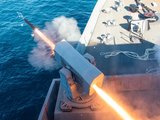Marshall to support MBDA missile systems
Marshall Aerospace and Defence Group has received a £13.5 million contract from MBDA to manufacture Common Anti-Air Modular Missile (CAMM) canisters for the Sea Ceptor and Land Ceptor weapon systems, the company announced on 11 September.
Under the contract, Marshall will deliver canisters as a semi-installed unit to MBDA.
The contract includes further options for future CAMM requirements plus the potential for a CAMM Extended Range Canister currently in development.
Marshall also supports the Land Ceptor programme through its design, manufacture and integration of sub-systems equipment for the Land Ceptor Fire Unit Support Vehicle.
Alistair McPhee, CEO of Marshall ADG, said: ‘MBDA have placed trust in us to support them for over five years and to be part of the team delivering the most modern air defence system of its type in the world, is something we all feel very proud of; it affirms our ability to deliver and be a trusted supplier to MBDA and continue to support and protect armed forces around the world.’
More from Naval Warfare
-
![European navies line up $105.8 billion in unawarded contracts for 2026]()
European navies line up $105.8 billion in unawarded contracts for 2026
France, Germany and Italy lead the way on unawarded naval defence opportunities that could be awarded this year, but across Europe countries are ramping up their spending efforts to face geopolitical challenges.
-
![Spain’s F100 upgrade mirrors Aegis modernisation paths in allied navies]()
Spain’s F100 upgrade mirrors Aegis modernisation paths in allied navies
The Spanish Navy’s Alvaro de Bazan-class of air defence frigates will receive the latest Aegis Weapon System technology among other modernisations to extend the service life to 2045.
-
![UK’s Fleet Solid Support ship programme deemed on track despite steel supply concerns]()
UK’s Fleet Solid Support ship programme deemed on track despite steel supply concerns
Shipbuilders are saying the programme is going ahead on time as the government estimates 7.7 million tonnes of steel are needed for 2026 infrastructure projects.
-
![Raytheon unveils details of its proposal for the US Navy/NATO ESSM Next Significant Variant]()
Raytheon unveils details of its proposal for the US Navy/NATO ESSM Next Significant Variant
In an exclusive interview with Shephard, Raytheon’s VP of Shipboard Missiles disclosed what improvements the company plans to offer for the Sea Sparrow NSV.






















